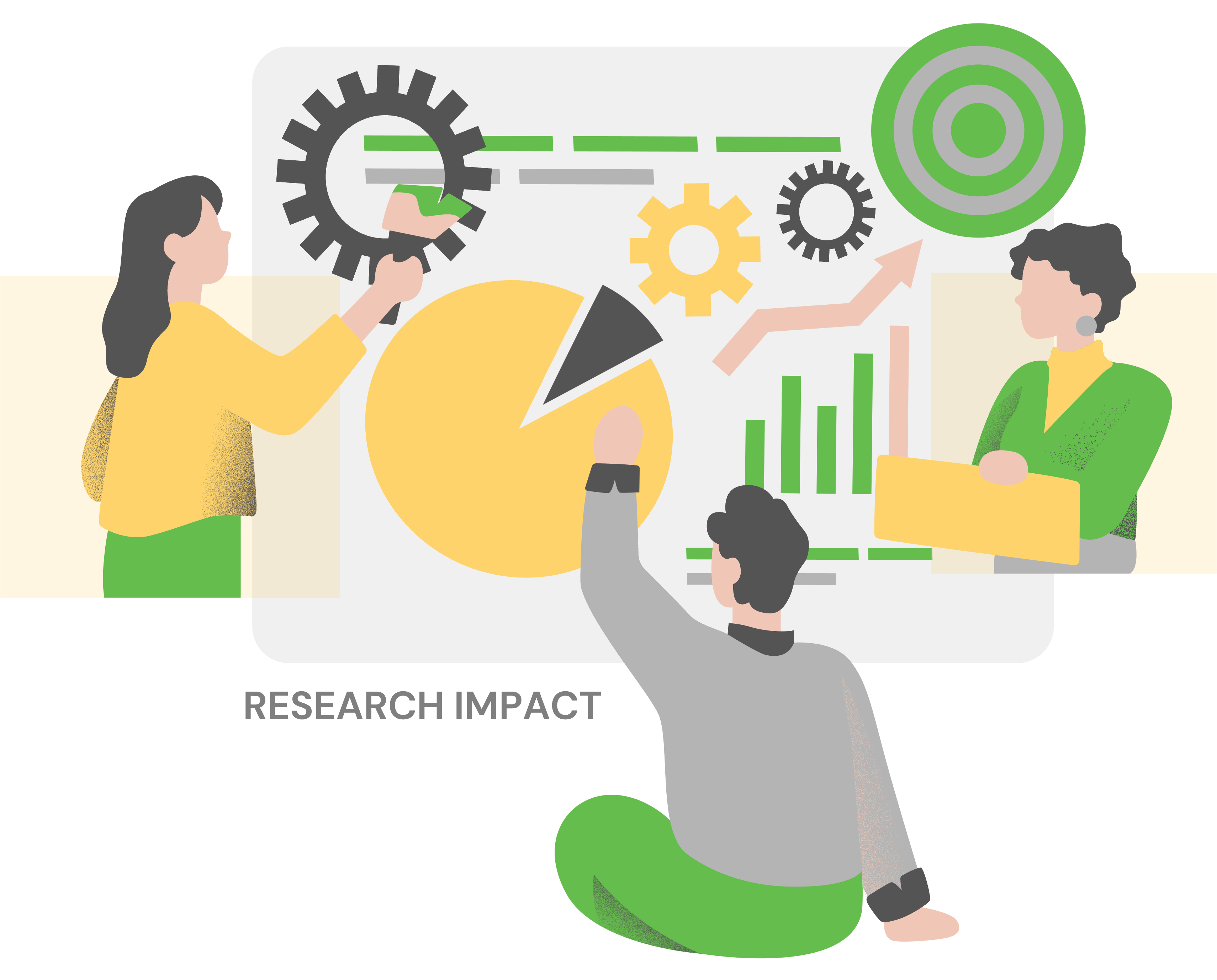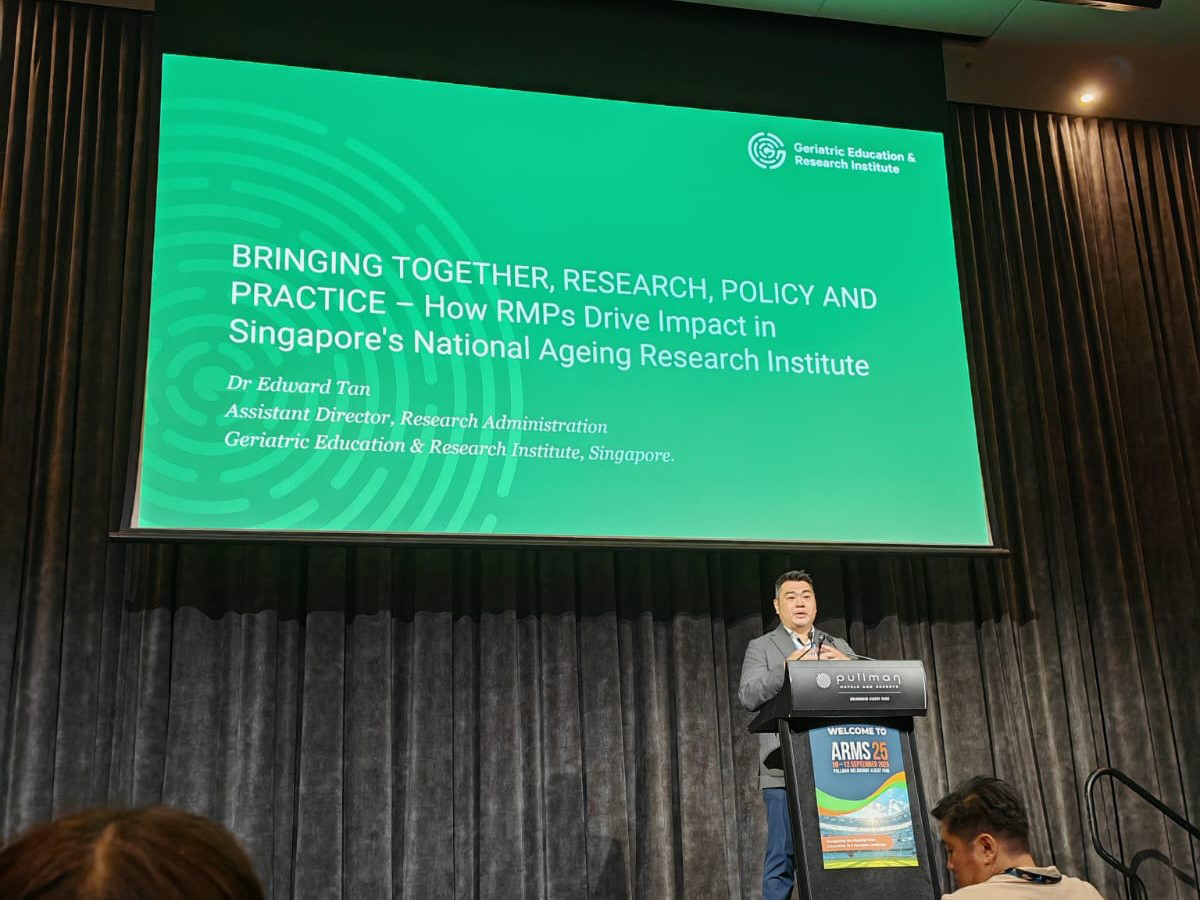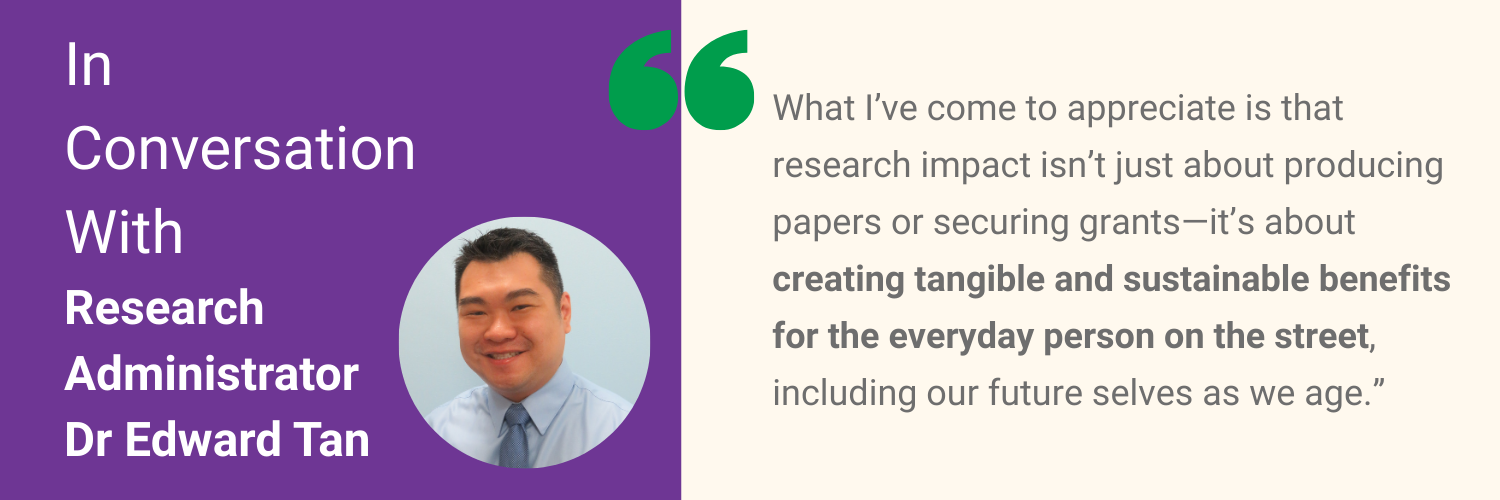Facilitating research impact in an ageing research institute: Interview with Research Administrator, Dr Edward Tan
23 September 2025
With the pressures of an ageing population, it is critical to turn research evidence into effective programmes, interventions and policies that improve the health of older persons. Read more about the evolution of research impact at GERI.

Every day, numerous scientific discoveries emerge across healthcare and related fields. A key challenge lies in going beyond creating knowledge to ensuring it benefits society.
This idea of impactful research resonates strongly with Singapore’s national research agenda. As Chairman of the National Research Foundation (NRF), Mr Heng Swee Keat, highlighted, ‘bringing diverse stakeholders together... to pursue research impact at scale’ is one of the NRF’s approaches in the Research, Innovation and Enterprise 2030 masterplan.
And with the pressures of an ageing population, there is an even greater need to turn research evidence into effective programmes, interventions and policies that improve the health of older persons.
In this feature, we catch up with Dr Edward Tan, Assistant Director, Research Administration, to hear more about the evolution of research impact at GERI.
GERI: Why is GERI focusing on research impact?
Dr Edward Tan: GERI’s focus on research impact stems from our core mission to improve the lives of older adults in Singapore, and reflects a natural evolution of our research to health policy and practice. Central to this mission is also the recognition that producing high-quality research alone isn’t enough.
Similar to overcoming the ‘valley of death’ in commercialisation of research, we also need a way to ensure that our findings translate into meaningful improvements in healthcare delivery and outcomes for our older population.
When we look at places like the United Kingdom, for example, they’ve had the Research Excellence Framework in place since 2008 to assess the impact of research outside of academia. With the call for research impact growing around the world, we saw an opportunity to seize on this momentum.
By strengthening our emphasis on research impact, we hope to further narrow the translation gap between research and policy or practice. At the end of the day, our goal is to ensure the research work we do at GERI directly contributes to better health outcomes, more effective care delivery systems, and evidence-informed policy and practice decisions for Singapore’s ageing population.

Dr Edward Tan at the Australasian Research Management Society (ARMS) conference 2025. Image: GERI
To support this initiative, GERI has developed a comprehensive Framework to guide how we measure and showcase the impact of our research.
You have played an instrumental role in developing GERI’s Research Impact Framework (RIF). Could you tell us about more about it?
When developing our RIF, we started by assessing international literature and best practices, and then we adapted these insights to fit both Singapore’s healthcare context and GERI’s specific needs.
We drew particular inspiration from two established frameworks: the Canadian Academy of Health Sciences (CAHS) Impact framework (2009) and the Association of Australian Medical Research Institutes (AAMRI) Impact Report (2021). What attracted us to these frameworks was how comprehensive they were, while still being easy to understand and use.
Currently, our RIF is structured around seven categories, each capturing different aspects of research impact. Within each category, we’ve included specific indicators to measure progress, outputs and/or outcomes. Perhaps most importantly, our Framework is flexible enough to be adapted further to suit the evolving research landscape.
But the RIF not only showcases the outcomes and impact that we aspire to attain. Through these useful indicators, it also serves as a practical roadmap for our researchers as they design and operationalise their research projects. Additionally, it guides them on how to effectively ‘hand off’ or pass their research findings to end-users who can put them into practice.
In developing GERI’s RIF, you have had the opportunity to interact with management, researchers and corporate colleagues. How did you operationalise it across the organisation?
Our first step was to ensure everyone across the organisation shared the same understanding, perspectives, and expectations about research impact.
In fact, we conducted multiple consultation sessions with our researchers. During these sessions, we presented the background and motivation behind the GERI RIF, and went through indicators and definitions to ensure the Framework would be practical and meaningful.
While it’s still a work in progress, we’ve also designed impact workbooks that serve as a ‘single source of truth’—something that can be used across multiple functions, from reporting to generating case narratives.
Our metrics capture the shorter-term outputs and impacts. And we recognise that tracking the longer-term impact of our work requires sustained engagement and relationship building through trust.
By taking an inclusive approach and welcoming feedback from our researchers, it has helped the RIF evolve and stay relevant to GERI’s research direction.
Having been a researcher yourself, what does “research impact” mean to you?

Research impact, to me, represents the fulfilment of a commitment to help others. Growing up, I’ve always been interested about healthcare, medicine and helping others though my involvement in school with the St John Ambulance Brigade and pursuing pre-med studies in junior college. While life took me down a different path through scientific research and eventually to research management, my core motivation remained the same: making a meaningful difference to people, through health.
What I’ve come to appreciate is that research impact isn’t just about producing papers or securing grants—it’s about creating tangible and sustainable benefits for the everyday person on the street, including our future selves as we age. Whether it’s through improving care delivery systems, informing policy decisions, or developing new interventions, research impact means changing today for a better tomorrow.
Over the past six years, I have been very blessed to work alongside GERI’s researchers who share my passion and belief to be a force of good in the world, and that our work contributes to better health outcomes for our ageing population.
